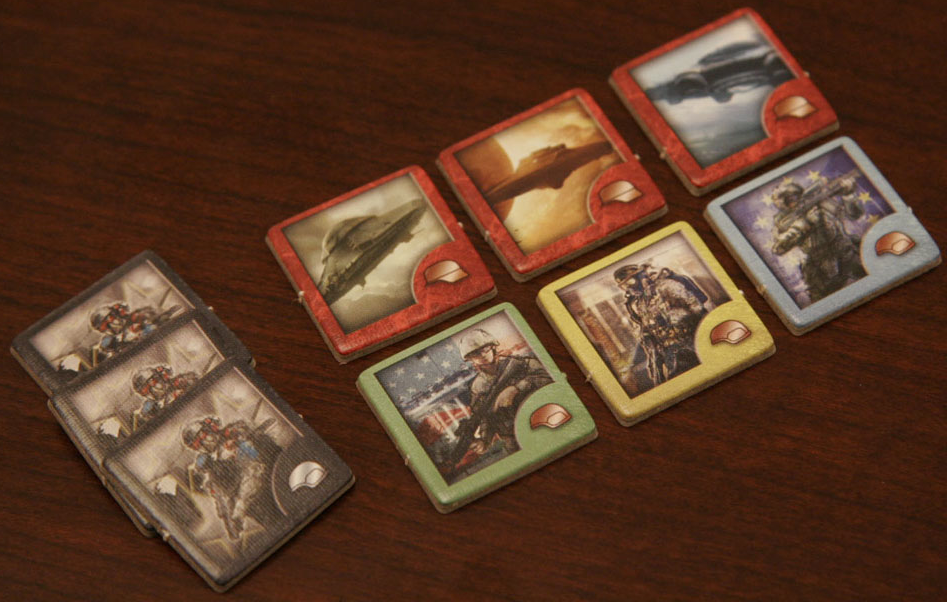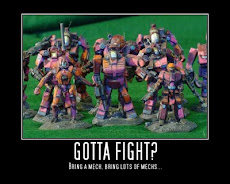This is the first ever guest blog. My friend Al Treacher who has started his own blog here, and I wanted to introduce him to all my readers. He's a fellow wargamer and board-game geek, so go check out his blog after reading this.
Some context in talking about
Iron Sky:
The Board Game is needed. For those who don’t know,
Iron Sky was a
2012 comedy/sci-fi film by Finnish director Timo Vuorensola, about
the return to Earth in 2018 of the remnants of the Nazi regime from
their base on the dark side of the moon where they fled in 1945.
Yes – it’s a film about Space Nazis from the Moon! And if this
sounds like a premise for a B-movie then you’d be absolutely right
–
Iron Sky is a modern sci-fi B-movie, sprinkled with dark humour
and not-so-subtle satire. The female lead is the very cute Julia
Deitze too, which is a bonus.
Sadly, but possibly to no great
surprise, the film wasn’t a massive success with the critics or
majority of the movie-going public. It’s tricky subject matter,
let’s be honest, I thought it a fun B-movie, and it works on that level. But this isn’t a review
of the film but of the board game of the film, released in the same
year.
Published by
Revision Games,
Iron Sky:
The Board Game is a
boardgame – arguably a wargame – for two to
six players, a more accurate description would be for two, four or six players. Players play as either the Reich side (the
returning Moon Nazis) or the United World Confederation (the forces
of the various Earth nations defending the planet); each pair of
Reich/UWC players faces off over a map-board depicting (broadly) two
Earth continents.
The components (all
cardboard, no plastic) are of decent quality and appearance consisting of:
Three
map-boards, which side-by-side show a global map,
Six sets of unit
counters (paired sets of Reich/UWC forces in blue, yellow and green)
Six different decks of command cards
Two decks of combat cards
And a
handful of counters for scoring and various other purposes
The
rulebook is appropriately bi-lingual in English and German, nicely
illustrated and quite comprehensive; although the layout and order of
the rulebook while certainly good enough, would benefit from changing
the ordering of the book a little.
The basic premise of the game is – as
I’m sure is no surprise – that the invading Reich forces are
trying to wrest control of the Earth from the defending UWC forces.
Each continental board has seven territories (worth between 1 and 4
victory points each at the end of the game) which initially start off
under UWC control, while the Reich forces start in orbit above the
planet. Each map-board has three orbital zones from which the
classically saucer-esque Reich units descend onto the planet surface
(and indeed can retreat to orbit where necessary or to move to other
territories or continents). While each player deploys on their
‘own’ continent (or in orbit above, for the Reich player) and
concentrates on winning the war in their own territories, it is
possible to move from ‘your’ map-board onto the other continents
to assist your compatriots. Since final victory or defeat is decided
per faction rather than player, aiding your fellows may prove
to be vitally important.
Each player represents a specific
commander with a unique command deck and abilities; the UWC
commanders are politician, general and agent while the Reich
commanders are all generals (specialising in ground assaults, orbital
bombardment and rapid raiding). Each turn sees all the Reich players
act (simultaneously) first, then the UWC players take their
(simultaneous) turn. Command cards have a given cost (in command
points, political points or dollars) that must be paid to play them,
but as many cards may be played per turn as the player can afford.
Players receive new resource points at the start of each turn
according to how the battle is faring on their particular continent.
Available commands are pretty
straightforward including:
Recruit, Mobilize (move and/or attack)
Raid (recruit and mobilize combined)
As well as implementing
electronic warfare or terror attacks (to restrict movement of the
opponent’s forces).
The concept of combined arms is not a feature
of the game – all units are effectively the same, no matter which
player or faction they belong to.
Destroyed UWC units are returned
to the owning player, making them available for later recruitment.
Destroyed Reich forces however are gone, and stored for end-of-game
VPs by the UWC player responsible for their defeat. There’s only a
limited supply of Nazi UFOs, which is only to be expected!
Combat is straightforward once you’ve
got the hang of it, but it’s very different to any game system I’ve
previously played, so it helped to actually see it in action during
the first play.
Under the basic rules two players involved in a conflict choose, defender
first, one combat card from their available choice of two. The cards
are chosen face down so that the exact effects of the card are
unknown, but an estimate may be made from the icon on the card back
which identifies it as being mainly defensive, attacking, or balanced
in its effect. The cards are then compared, hits are doled out/defended against, casualties are removed, and if one side is
completely eliminated, the territory is held/taken by the remaining
units. Command cards can be played in any order as long as resources
to pay for them are available, so for example a second attack could be launched
to finish off a weakened foe or reinforce a newly taken territory.
After a predetermined number of turns
(eight in the basic rules) the game ends victory points are
totalled up for:
Territory held by each faction
For destroyed Reich
units
And for VPs shown on the blitzmeter on the side of each
continental board (a very clever concept, which I liked a lot that
determines resources per turn as well as end-of-game VPs).
The Reich
player gets awarded the VPs from this scale according to their
strongest moment of
The UWC player receives VPs for
their end-of-game position.
It may pay the Reich player to hit very
hard and fast, even if subsequently some of the territories so gained
are lost.
There are optional rules that add
powerful use-once-and-discard command cards, secret personal
objective cards for additional victory points at game end, UWC Special Forces units (expensive to recruit, very resilient but
grant the Reich player bonus VPs if destroyed) and a couple of
options to reduce the randomness of the combat element. The unknown
game-length rule is a must include in my opinion to avoid the last
turn all out syndrome. The optional rules aren’t complex, and I
would suggest most should be included once a player has learned the
basics of the game.
Before heading into a conclusion, I have to say that I’ve only got this to the
table as a two-player game against my partner. With more players playing
each faction and with more map-boards in play, the chance to aid and be
aided by your allies exists; as well as the threat of the highly
mobile Reich saucers zipping along the orbital zones at the top of
the map, suddenly turning up where least desired, would increase
the challenges and tension.
Once we’d got to grips with the rules
in action, the game played very quickly.
Our first play used only
the basic rules, but using the optional ones didn’t really
add any noticeable time to the games, which is less than an hour per play. We
were a bit disappointed, because we both wanted to enjoy the
game as much as the movie, but the two-player game
felt rather thin, basic and a bit
small. There’s only one map-board with seven locations to fight
over. There’s an artificial, but workable mechanism to represent
the ability of the other continents to provide aid while they fight
their part of the war off-screen, unseen. The theme was there, but
it didn’t capture us.
The biggest game issue we had was with
the combat resolution via the combat cards.
Even having
(theoretically) a rough idea of the nature of the card you were
choosing, the effects could still be arbitrary and unexpected. This
is particularly true when playing the basic rules; the optional rules
(initiative & controlled combat) give more control and
flexibility in combat, and do improve the game-play, but a significant
random element remains.
I’d love to be writing a more
positive review of the game than this. Being a fan of the movie I
naturally hoped for the game to be good. Would playing the game with
four or six players make it significantly better than with only two?
A bit, probably, if the other players were also into the film.
Sadly, the theme doesn’t feel integral to the game, and with such a
vivid concept that’s a missed opportunity. There’s not enough
meat to the game to make it a solid wargame, and the theme
isn’t strong enough within the game to enable me to overlook the
weaknesses. Described on the publisher’s website as
a
middleweight strategy game it’s actually fairly light; at least
for an experienced gamer, even though first glance at the rulebook
may seem daunting!
A sequel, Iron Sky: The
Coming Race is slated for 2015/2016; we can speculate
whether this may bring about a reprint or improved edition/sequel of Iron
Sky: The Board Game.

.jpg)

.jpg)

.png)
.png)

.png)
.png)
.png)
.png)
.png)
.png)

.png)


.png)
.png)
.png)
.png)
.png)
.png)
.png)



















.png)

.png)

.png)








.png)




